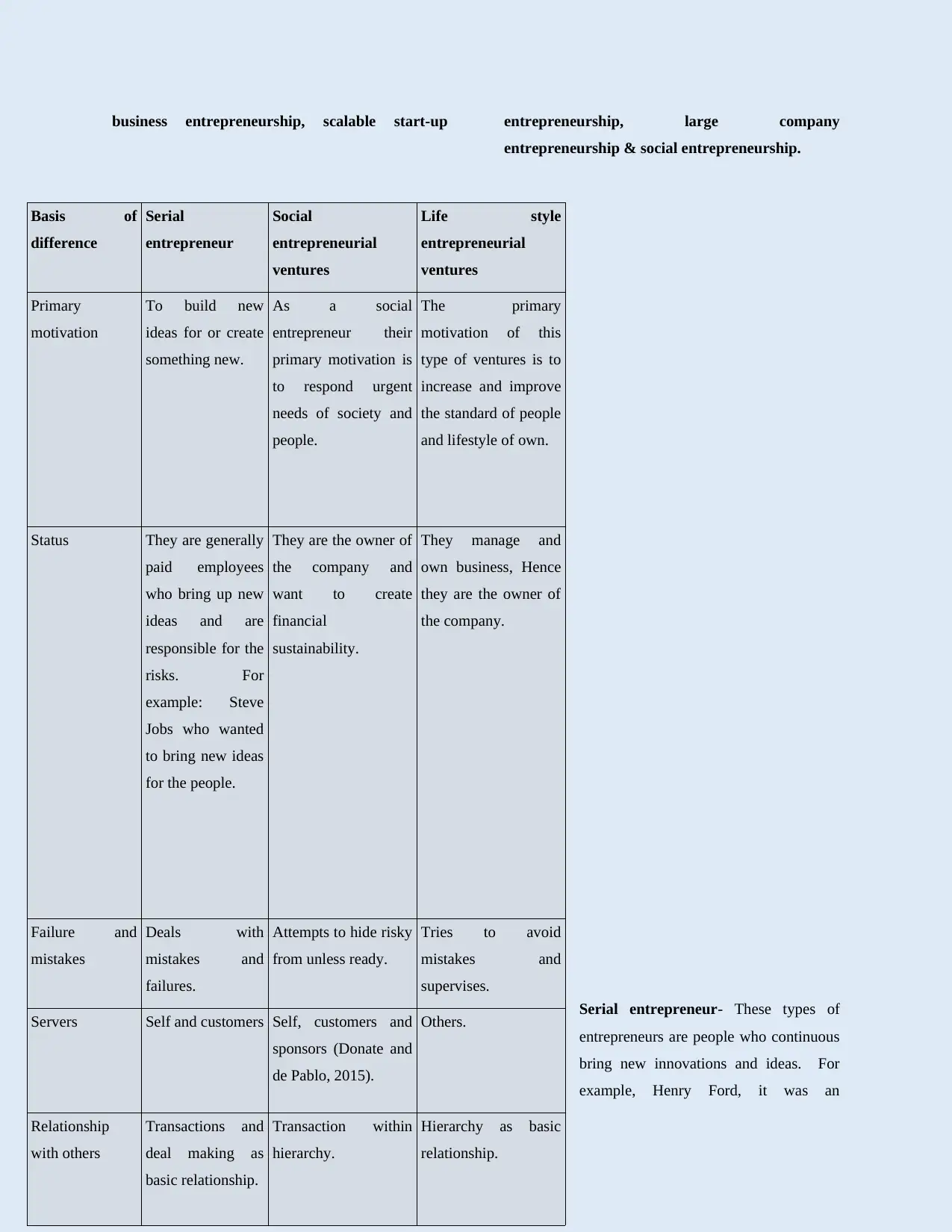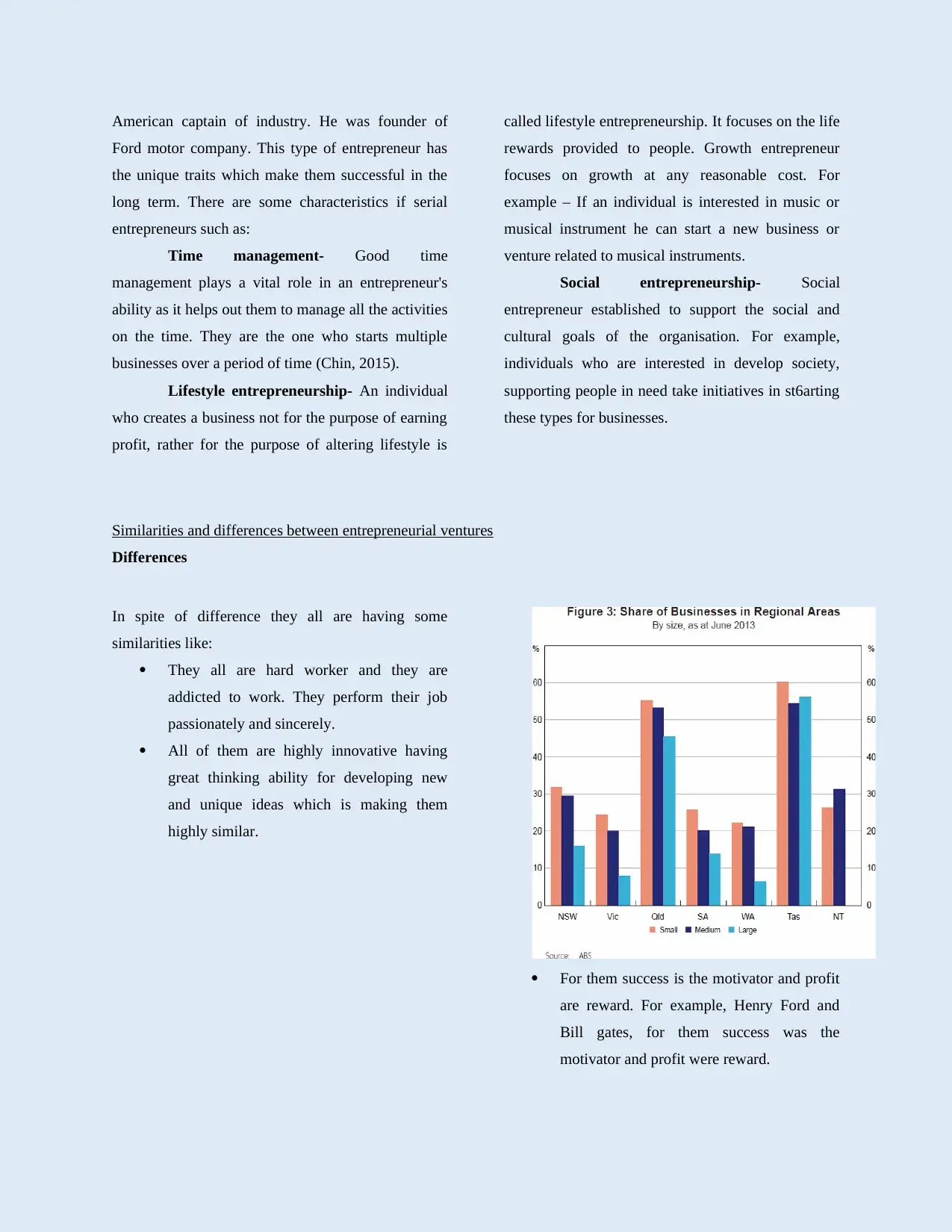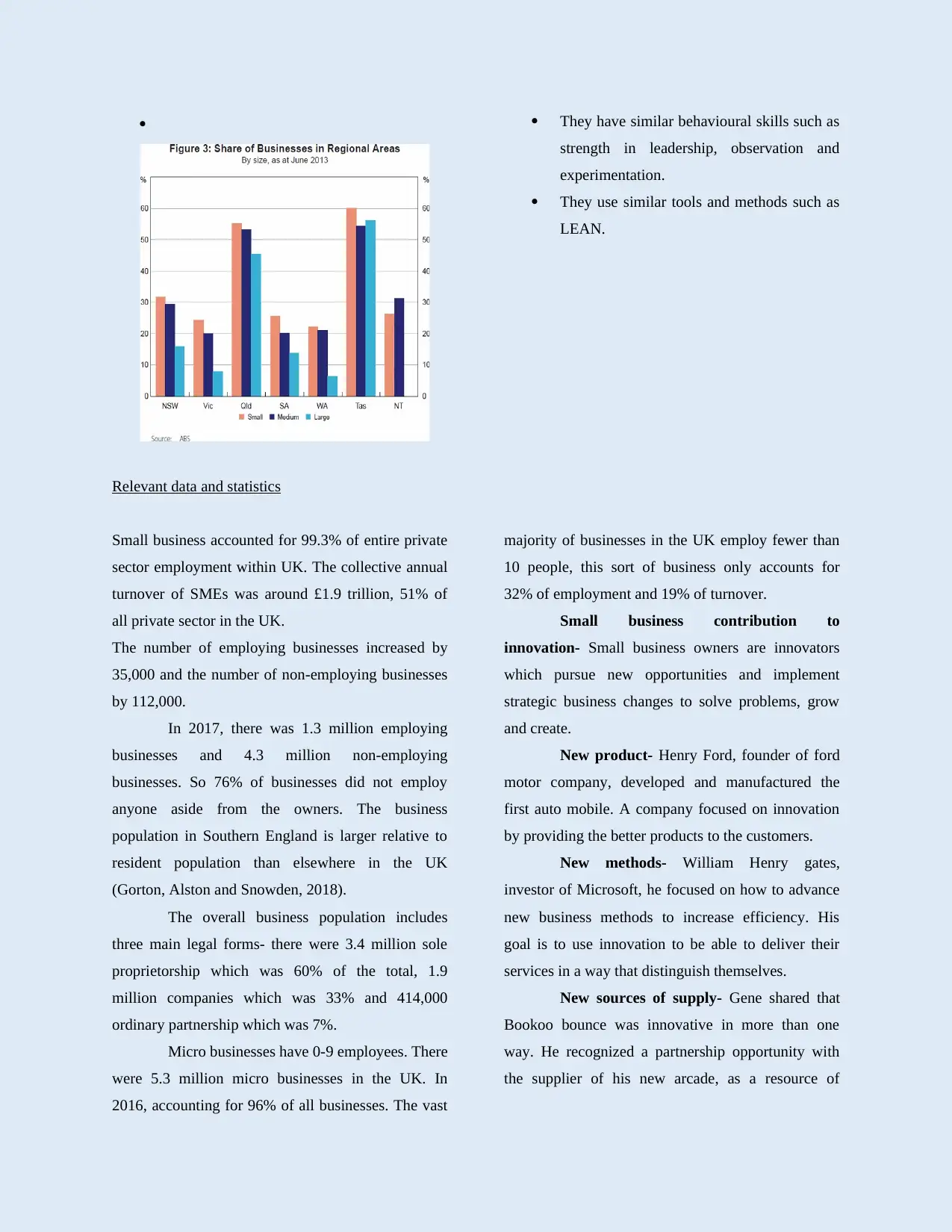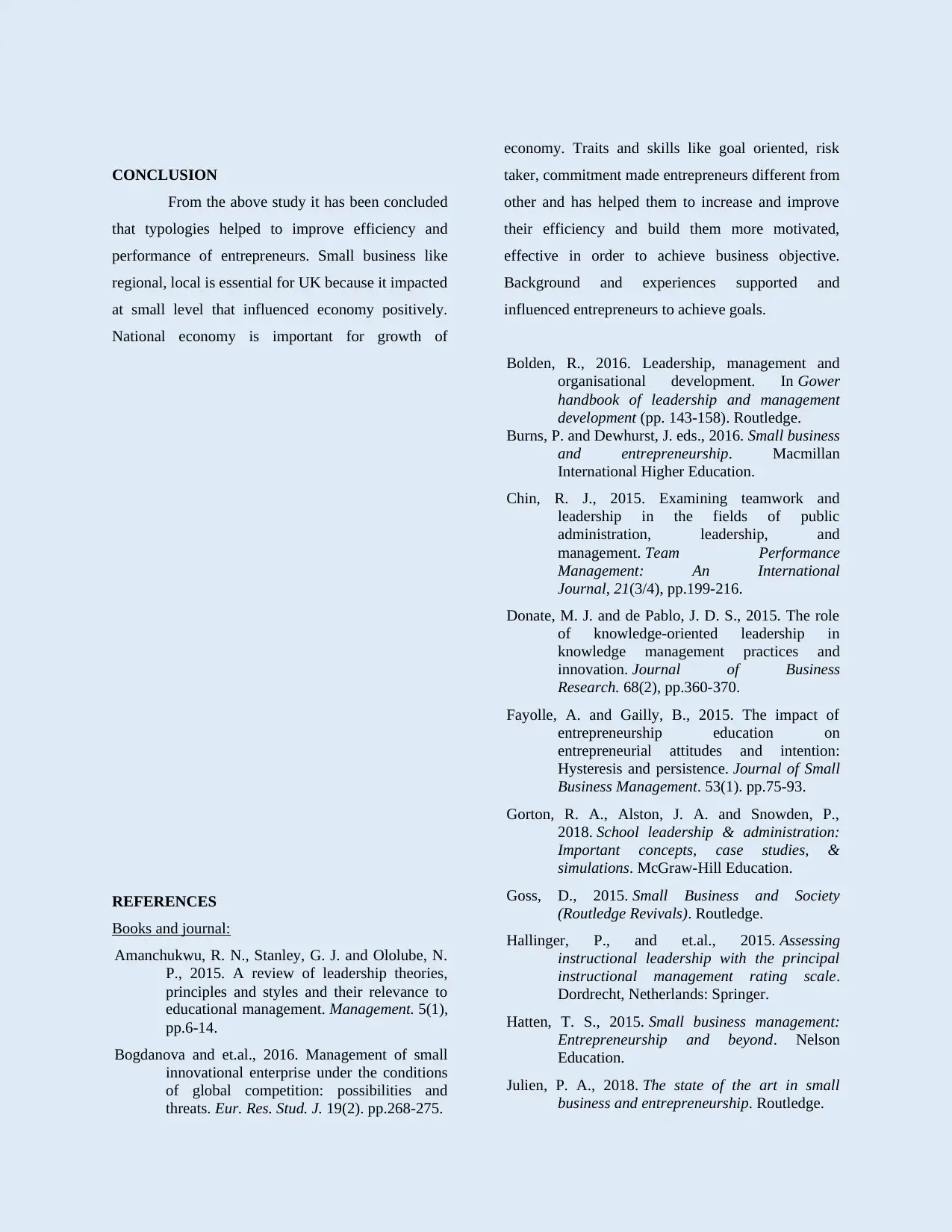ENT301 Report: Entrepreneurship and Small Business Management Overview
VerifiedAdded on 2020/10/22
|9
|2513
|134
Report
AI Summary
This report provides a comprehensive overview of entrepreneurship and small business management. It begins by defining entrepreneurship and small businesses, differentiating between entrepreneurial ventures and small businesses. The report explores various types of entrepreneurship, including societal entrepreneurship, owner-managers, and intrepreneurs, along with the characteristics and skills of successful entrepreneurs, like time management and creativity. It highlights the similarities and differences between entrepreneurial ventures, supported by relevant data and statistics on the importance of small businesses in the UK, including their contribution to innovation and the growth of the social economy. The report also discusses the impact of small businesses on local, regional, and national economies. It provides a detailed analysis of entrepreneurial characteristics, experience, and background influence on entrepreneurial mindset and motivations, concluding that these factors are crucial for business success. This report is available on Desklib, a platform offering AI-powered study tools for students.

ENTREPRENEURSHIP AND SMALL BUSINESS MANAGEMENT
Paraphrase This Document
Need a fresh take? Get an instant paraphrase of this document with our AI Paraphraser


TABLE OF CONTENTS
INTRODUCTION 1
Activity 1: Booklet 1
Different kinds of entrepreneurial ventures and
their typologies.....................................................1
Similarities and differences between
entrepreneurial ventures.......................................2
Relevant data and statistics...................................4
The importance of small businesses and business
start-ups to the growth of the social economy......5
CONCLUSION 7
REFERENCES 7
INTRODUCTION
Small businesses are run by individuals.
Entrepreneurship is the volume to organize, manage
and develop business for making revenue. It will
examine different types of entrepreneurship. It will
demonstrate similarities and differences between
entrepreneurial ventures. This report will explain
features, skills and traits of successful entrepreneurs
that makes them different and unique from other
managers or owners of businesses. It will elaborate
the way in which characteristics of the
entrepreneurial personality imitate entrepreneurial
mind-set and motivation. This report will identify the
various argument in relation to entrepreneurial
characteristics. This study will also discuss how
experience and background can foster or hinder
entrepreneurship.
Activity 1: Booklet
MAKE IT WORK
Different kinds of entrepreneurial ventures and their
typologies
An individual who starts any type of business with
limited resources is known as entrepreneur. They
take the responsibility for all the risks & rewards of
the ventures. Entrepreneurial ventures focus on new,
innovative offers and products whereas, small
businesses are dealing with established and known
products (Amanchukwu, Stanley and Ololube, 2015).
Entrepreneur faces unknown risks as it deals with
unknown and new products. It targets rapid growth
and high return.
Typology generally refers the kinds of
entrepreneurship.
Societal entrepreneur, owner manager &
entrepreneur.
Interest, creativity and innovation-
Another factor which serial entrepreneurs possess is
creativity. It helps them to address things, search out
new data and think of problematic answers for
existing issues (Bolden, 2016).
Intrepreneur- An intrepreneur is a person
who behaves like an entrepreneur whilst being
employed. An entrepreneur is a person who have
entrepreneur skills but work within a company or an
organisation as an employee. They are encouraged by
the company to develop their ideas into a workable
product. An intrepreneur is motivated and creative.
The benefit of being an intrepreneur is that the risk of
failure becomes less.
Owner manager- A person who owns and
manages business is known as owner manager. They
are responsible for the day to day activities. Bill gates
is an American business magnate, investor known for
the founder of Microsoft Corporation.
Different types of entrepreneurial ventures
There are various kinds of entrepreneurial
businesses and ventures for example small
INTRODUCTION 1
Activity 1: Booklet 1
Different kinds of entrepreneurial ventures and
their typologies.....................................................1
Similarities and differences between
entrepreneurial ventures.......................................2
Relevant data and statistics...................................4
The importance of small businesses and business
start-ups to the growth of the social economy......5
CONCLUSION 7
REFERENCES 7
INTRODUCTION
Small businesses are run by individuals.
Entrepreneurship is the volume to organize, manage
and develop business for making revenue. It will
examine different types of entrepreneurship. It will
demonstrate similarities and differences between
entrepreneurial ventures. This report will explain
features, skills and traits of successful entrepreneurs
that makes them different and unique from other
managers or owners of businesses. It will elaborate
the way in which characteristics of the
entrepreneurial personality imitate entrepreneurial
mind-set and motivation. This report will identify the
various argument in relation to entrepreneurial
characteristics. This study will also discuss how
experience and background can foster or hinder
entrepreneurship.
Activity 1: Booklet
MAKE IT WORK
Different kinds of entrepreneurial ventures and their
typologies
An individual who starts any type of business with
limited resources is known as entrepreneur. They
take the responsibility for all the risks & rewards of
the ventures. Entrepreneurial ventures focus on new,
innovative offers and products whereas, small
businesses are dealing with established and known
products (Amanchukwu, Stanley and Ololube, 2015).
Entrepreneur faces unknown risks as it deals with
unknown and new products. It targets rapid growth
and high return.
Typology generally refers the kinds of
entrepreneurship.
Societal entrepreneur, owner manager &
entrepreneur.
Interest, creativity and innovation-
Another factor which serial entrepreneurs possess is
creativity. It helps them to address things, search out
new data and think of problematic answers for
existing issues (Bolden, 2016).
Intrepreneur- An intrepreneur is a person
who behaves like an entrepreneur whilst being
employed. An entrepreneur is a person who have
entrepreneur skills but work within a company or an
organisation as an employee. They are encouraged by
the company to develop their ideas into a workable
product. An intrepreneur is motivated and creative.
The benefit of being an intrepreneur is that the risk of
failure becomes less.
Owner manager- A person who owns and
manages business is known as owner manager. They
are responsible for the day to day activities. Bill gates
is an American business magnate, investor known for
the founder of Microsoft Corporation.
Different types of entrepreneurial ventures
There are various kinds of entrepreneurial
businesses and ventures for example small
⊘ This is a preview!⊘
Do you want full access?
Subscribe today to unlock all pages.

Trusted by 1+ million students worldwide

business entrepreneurship, scalable start-up entrepreneurship, large company
entrepreneurship & social entrepreneurship.
Serial entrepreneur- These types of
entrepreneurs are people who continuous
bring new innovations and ideas. For
example, Henry Ford, it was an
Basis of
difference
Serial
entrepreneur
Social
entrepreneurial
ventures
Life style
entrepreneurial
ventures
Primary
motivation
To build new
ideas for or create
something new.
As a social
entrepreneur their
primary motivation is
to respond urgent
needs of society and
people.
The primary
motivation of this
type of ventures is to
increase and improve
the standard of people
and lifestyle of own.
Status They are generally
paid employees
who bring up new
ideas and are
responsible for the
risks. For
example: Steve
Jobs who wanted
to bring new ideas
for the people.
They are the owner of
the company and
want to create
financial
sustainability.
They manage and
own business, Hence
they are the owner of
the company.
Failure and
mistakes
Deals with
mistakes and
failures.
Attempts to hide risky
from unless ready.
Tries to avoid
mistakes and
supervises.
Servers Self and customers Self, customers and
sponsors (Donate and
de Pablo, 2015).
Others.
Relationship
with others
Transactions and
deal making as
basic relationship.
Transaction within
hierarchy.
Hierarchy as basic
relationship.
entrepreneurship & social entrepreneurship.
Serial entrepreneur- These types of
entrepreneurs are people who continuous
bring new innovations and ideas. For
example, Henry Ford, it was an
Basis of
difference
Serial
entrepreneur
Social
entrepreneurial
ventures
Life style
entrepreneurial
ventures
Primary
motivation
To build new
ideas for or create
something new.
As a social
entrepreneur their
primary motivation is
to respond urgent
needs of society and
people.
The primary
motivation of this
type of ventures is to
increase and improve
the standard of people
and lifestyle of own.
Status They are generally
paid employees
who bring up new
ideas and are
responsible for the
risks. For
example: Steve
Jobs who wanted
to bring new ideas
for the people.
They are the owner of
the company and
want to create
financial
sustainability.
They manage and
own business, Hence
they are the owner of
the company.
Failure and
mistakes
Deals with
mistakes and
failures.
Attempts to hide risky
from unless ready.
Tries to avoid
mistakes and
supervises.
Servers Self and customers Self, customers and
sponsors (Donate and
de Pablo, 2015).
Others.
Relationship
with others
Transactions and
deal making as
basic relationship.
Transaction within
hierarchy.
Hierarchy as basic
relationship.
Paraphrase This Document
Need a fresh take? Get an instant paraphrase of this document with our AI Paraphraser

American captain of industry. He was founder of
Ford motor company. This type of entrepreneur has
the unique traits which make them successful in the
long term. There are some characteristics if serial
entrepreneurs such as:
Time management- Good time
management plays a vital role in an entrepreneur's
ability as it helps out them to manage all the activities
on the time. They are the one who starts multiple
businesses over a period of time (Chin, 2015).
Lifestyle entrepreneurship- An individual
who creates a business not for the purpose of earning
profit, rather for the purpose of altering lifestyle is
called lifestyle entrepreneurship. It focuses on the life
rewards provided to people. Growth entrepreneur
focuses on growth at any reasonable cost. For
example – If an individual is interested in music or
musical instrument he can start a new business or
venture related to musical instruments.
Social entrepreneurship- Social
entrepreneur established to support the social and
cultural goals of the organisation. For example,
individuals who are interested in develop society,
supporting people in need take initiatives in st6arting
these types for businesses.
Similarities and differences between entrepreneurial ventures
Differences
In spite of difference they all are having some
similarities like:
They all are hard worker and they are
addicted to work. They perform their job
passionately and sincerely.
All of them are highly innovative having
great thinking ability for developing new
and unique ideas which is making them
highly similar.
For them success is the motivator and profit
are reward. For example, Henry Ford and
Bill gates, for them success was the
motivator and profit were reward.
Ford motor company. This type of entrepreneur has
the unique traits which make them successful in the
long term. There are some characteristics if serial
entrepreneurs such as:
Time management- Good time
management plays a vital role in an entrepreneur's
ability as it helps out them to manage all the activities
on the time. They are the one who starts multiple
businesses over a period of time (Chin, 2015).
Lifestyle entrepreneurship- An individual
who creates a business not for the purpose of earning
profit, rather for the purpose of altering lifestyle is
called lifestyle entrepreneurship. It focuses on the life
rewards provided to people. Growth entrepreneur
focuses on growth at any reasonable cost. For
example – If an individual is interested in music or
musical instrument he can start a new business or
venture related to musical instruments.
Social entrepreneurship- Social
entrepreneur established to support the social and
cultural goals of the organisation. For example,
individuals who are interested in develop society,
supporting people in need take initiatives in st6arting
these types for businesses.
Similarities and differences between entrepreneurial ventures
Differences
In spite of difference they all are having some
similarities like:
They all are hard worker and they are
addicted to work. They perform their job
passionately and sincerely.
All of them are highly innovative having
great thinking ability for developing new
and unique ideas which is making them
highly similar.
For them success is the motivator and profit
are reward. For example, Henry Ford and
Bill gates, for them success was the
motivator and profit were reward.

They have similar behavioural skills such as
strength in leadership, observation and
experimentation.
They use similar tools and methods such as
LEAN.
Relevant data and statistics
Small business accounted for 99.3% of entire private
sector employment within UK. The collective annual
turnover of SMEs was around £1.9 trillion, 51% of
all private sector in the UK.
The number of employing businesses increased by
35,000 and the number of non-employing businesses
by 112,000.
In 2017, there was 1.3 million employing
businesses and 4.3 million non-employing
businesses. So 76% of businesses did not employ
anyone aside from the owners. The business
population in Southern England is larger relative to
resident population than elsewhere in the UK
(Gorton, Alston and Snowden, 2018).
The overall business population includes
three main legal forms- there were 3.4 million sole
proprietorship which was 60% of the total, 1.9
million companies which was 33% and 414,000
ordinary partnership which was 7%.
Micro businesses have 0-9 employees. There
were 5.3 million micro businesses in the UK. In
2016, accounting for 96% of all businesses. The vast
majority of businesses in the UK employ fewer than
10 people, this sort of business only accounts for
32% of employment and 19% of turnover.
Small business contribution to
innovation- Small business owners are innovators
which pursue new opportunities and implement
strategic business changes to solve problems, grow
and create.
New product- Henry Ford, founder of ford
motor company, developed and manufactured the
first auto mobile. A company focused on innovation
by providing the better products to the customers.
New methods- William Henry gates,
investor of Microsoft, he focused on how to advance
new business methods to increase efficiency. His
goal is to use innovation to be able to deliver their
services in a way that distinguish themselves.
New sources of supply- Gene shared that
Bookoo bounce was innovative in more than one
way. He recognized a partnership opportunity with
the supplier of his new arcade, as a resource of
strength in leadership, observation and
experimentation.
They use similar tools and methods such as
LEAN.
Relevant data and statistics
Small business accounted for 99.3% of entire private
sector employment within UK. The collective annual
turnover of SMEs was around £1.9 trillion, 51% of
all private sector in the UK.
The number of employing businesses increased by
35,000 and the number of non-employing businesses
by 112,000.
In 2017, there was 1.3 million employing
businesses and 4.3 million non-employing
businesses. So 76% of businesses did not employ
anyone aside from the owners. The business
population in Southern England is larger relative to
resident population than elsewhere in the UK
(Gorton, Alston and Snowden, 2018).
The overall business population includes
three main legal forms- there were 3.4 million sole
proprietorship which was 60% of the total, 1.9
million companies which was 33% and 414,000
ordinary partnership which was 7%.
Micro businesses have 0-9 employees. There
were 5.3 million micro businesses in the UK. In
2016, accounting for 96% of all businesses. The vast
majority of businesses in the UK employ fewer than
10 people, this sort of business only accounts for
32% of employment and 19% of turnover.
Small business contribution to
innovation- Small business owners are innovators
which pursue new opportunities and implement
strategic business changes to solve problems, grow
and create.
New product- Henry Ford, founder of ford
motor company, developed and manufactured the
first auto mobile. A company focused on innovation
by providing the better products to the customers.
New methods- William Henry gates,
investor of Microsoft, he focused on how to advance
new business methods to increase efficiency. His
goal is to use innovation to be able to deliver their
services in a way that distinguish themselves.
New sources of supply- Gene shared that
Bookoo bounce was innovative in more than one
way. He recognized a partnership opportunity with
the supplier of his new arcade, as a resource of
⊘ This is a preview!⊘
Do you want full access?
Subscribe today to unlock all pages.

Trusted by 1+ million students worldwide

maintaining the gaming equipment (Hallinger and et.al., 2015).
The importance of small businesses and business
start-ups to the growth of the social economy
Local economy- The small enterprises and start-ups
have a great impact on the local economies. It helps
in creating job opportunities for the people and
contribute in their growth and development.
Microsoft Company whose inventor is Bill gates
provide better employment facility to the people of
UK.
Small businesses play a major role in developing
local economy by facilitating innovation and growth
to the community. Many small start-ups and
businesses along with medium businesses like Ned
bank Private Wealth Company make the change,
have the capability to response and get familiar
rapidly to fluctuating economic conditions.
They help in providing employment to people. They
bring new ideas to economy and society and meet all
the local needs like financial consultancy. They also
help in building personal relationships with suppliers,
customers and employees.
Regional economy- The small start-ups and
businesses also play an important role in regional
economy. These businesses consist more than 99% of
the total number of industries and employ more than
41% of employees in UK. They are significant for
local development as they mostly utilise local
resources &the profit generated by these businesses
remains in that economy itself. The number of small
enterprises in UK is growing over time. This positive
development is based on the openness of business
environment for establishing the small business. It is
known and important for low overheads. Small and
start-ups businesses operate in small premises with
low cost related lightning, rent. It also provides its
goods on lower prices for customers.
National economy- Small and medium
businesses have the extraordinary capability to boost
economic growth. In recent years, they have recorded
a higher growth rate as compared to the international
industrial sector. The largest industry in UK are
retail, manufacturing and the repair of motor vehicles
like Henry Ford's company. 465 of small and medium
business revenue come from businesses in one of
these sectors (Pardey, 2016).
Reason behind the change
It is because of recession in UK in recent
times, the number of small businesses is increasing
day by day. On the other hand, this number is in
decreasing in other countries like Germany.
The restriction is another factor in
developing the small and medium business. Some
countries discourage to form small business as the
turnover contribution is much less in that field.
The importance of small businesses and business
start-ups to the growth of the social economy
Local economy- The small enterprises and start-ups
have a great impact on the local economies. It helps
in creating job opportunities for the people and
contribute in their growth and development.
Microsoft Company whose inventor is Bill gates
provide better employment facility to the people of
UK.
Small businesses play a major role in developing
local economy by facilitating innovation and growth
to the community. Many small start-ups and
businesses along with medium businesses like Ned
bank Private Wealth Company make the change,
have the capability to response and get familiar
rapidly to fluctuating economic conditions.
They help in providing employment to people. They
bring new ideas to economy and society and meet all
the local needs like financial consultancy. They also
help in building personal relationships with suppliers,
customers and employees.
Regional economy- The small start-ups and
businesses also play an important role in regional
economy. These businesses consist more than 99% of
the total number of industries and employ more than
41% of employees in UK. They are significant for
local development as they mostly utilise local
resources &the profit generated by these businesses
remains in that economy itself. The number of small
enterprises in UK is growing over time. This positive
development is based on the openness of business
environment for establishing the small business. It is
known and important for low overheads. Small and
start-ups businesses operate in small premises with
low cost related lightning, rent. It also provides its
goods on lower prices for customers.
National economy- Small and medium
businesses have the extraordinary capability to boost
economic growth. In recent years, they have recorded
a higher growth rate as compared to the international
industrial sector. The largest industry in UK are
retail, manufacturing and the repair of motor vehicles
like Henry Ford's company. 465 of small and medium
business revenue come from businesses in one of
these sectors (Pardey, 2016).
Reason behind the change
It is because of recession in UK in recent
times, the number of small businesses is increasing
day by day. On the other hand, this number is in
decreasing in other countries like Germany.
The restriction is another factor in
developing the small and medium business. Some
countries discourage to form small business as the
turnover contribution is much less in that field.
Paraphrase This Document
Need a fresh take? Get an instant paraphrase of this document with our AI Paraphraser

CONCLUSION
From the above study it has been concluded
that typologies helped to improve efficiency and
performance of entrepreneurs. Small business like
regional, local is essential for UK because it impacted
at small level that influenced economy positively.
National economy is important for growth of
economy. Traits and skills like goal oriented, risk
taker, commitment made entrepreneurs different from
other and has helped them to increase and improve
their efficiency and build them more motivated,
effective in order to achieve business objective.
Background and experiences supported and
influenced entrepreneurs to achieve goals.
REFERENCES
Books and journal:
Amanchukwu, R. N., Stanley, G. J. and Ololube, N.
P., 2015. A review of leadership theories,
principles and styles and their relevance to
educational management. Management. 5(1),
pp.6-14.
Bogdanova and et.al., 2016. Management of small
innovational enterprise under the conditions
of global competition: possibilities and
threats. Eur. Res. Stud. J. 19(2). pp.268-275.
Bolden, R., 2016. Leadership, management and
organisational development. In Gower
handbook of leadership and management
development (pp. 143-158). Routledge.
Burns, P. and Dewhurst, J. eds., 2016. Small business
and entrepreneurship. Macmillan
International Higher Education.
Chin, R. J., 2015. Examining teamwork and
leadership in the fields of public
administration, leadership, and
management. Team Performance
Management: An International
Journal, 21(3/4), pp.199-216.
Donate, M. J. and de Pablo, J. D. S., 2015. The role
of knowledge-oriented leadership in
knowledge management practices and
innovation. Journal of Business
Research. 68(2), pp.360-370.
Fayolle, A. and Gailly, B., 2015. The impact of
entrepreneurship education on
entrepreneurial attitudes and intention:
Hysteresis and persistence. Journal of Small
Business Management. 53(1). pp.75-93.
Gorton, R. A., Alston, J. A. and Snowden, P.,
2018. School leadership & administration:
Important concepts, case studies, &
simulations. McGraw-Hill Education.
Goss, D., 2015. Small Business and Society
(Routledge Revivals). Routledge.
Hallinger, P., and et.al., 2015. Assessing
instructional leadership with the principal
instructional management rating scale.
Dordrecht, Netherlands: Springer.
Hatten, T. S., 2015. Small business management:
Entrepreneurship and beyond. Nelson
Education.
Julien, P. A., 2018. The state of the art in small
business and entrepreneurship. Routledge.
From the above study it has been concluded
that typologies helped to improve efficiency and
performance of entrepreneurs. Small business like
regional, local is essential for UK because it impacted
at small level that influenced economy positively.
National economy is important for growth of
economy. Traits and skills like goal oriented, risk
taker, commitment made entrepreneurs different from
other and has helped them to increase and improve
their efficiency and build them more motivated,
effective in order to achieve business objective.
Background and experiences supported and
influenced entrepreneurs to achieve goals.
REFERENCES
Books and journal:
Amanchukwu, R. N., Stanley, G. J. and Ololube, N.
P., 2015. A review of leadership theories,
principles and styles and their relevance to
educational management. Management. 5(1),
pp.6-14.
Bogdanova and et.al., 2016. Management of small
innovational enterprise under the conditions
of global competition: possibilities and
threats. Eur. Res. Stud. J. 19(2). pp.268-275.
Bolden, R., 2016. Leadership, management and
organisational development. In Gower
handbook of leadership and management
development (pp. 143-158). Routledge.
Burns, P. and Dewhurst, J. eds., 2016. Small business
and entrepreneurship. Macmillan
International Higher Education.
Chin, R. J., 2015. Examining teamwork and
leadership in the fields of public
administration, leadership, and
management. Team Performance
Management: An International
Journal, 21(3/4), pp.199-216.
Donate, M. J. and de Pablo, J. D. S., 2015. The role
of knowledge-oriented leadership in
knowledge management practices and
innovation. Journal of Business
Research. 68(2), pp.360-370.
Fayolle, A. and Gailly, B., 2015. The impact of
entrepreneurship education on
entrepreneurial attitudes and intention:
Hysteresis and persistence. Journal of Small
Business Management. 53(1). pp.75-93.
Gorton, R. A., Alston, J. A. and Snowden, P.,
2018. School leadership & administration:
Important concepts, case studies, &
simulations. McGraw-Hill Education.
Goss, D., 2015. Small Business and Society
(Routledge Revivals). Routledge.
Hallinger, P., and et.al., 2015. Assessing
instructional leadership with the principal
instructional management rating scale.
Dordrecht, Netherlands: Springer.
Hatten, T. S., 2015. Small business management:
Entrepreneurship and beyond. Nelson
Education.
Julien, P. A., 2018. The state of the art in small
business and entrepreneurship. Routledge.

Mariotti, S. and Glackin, C., 2015. Entrepreneurship
& small business management. Pearson.
Pardey, D., 2016. Introducing leadership. Routledge.
Ramadani, V and et.al., 2015. The context of Islamic
entrepreneurship and business: Concept,
principles and perspectives. International
Journal of Business and Globalisation.15(3).
pp.244-261.
Storey, D., 2017. Six steps to heaven: Evaluating the
impact of public policies to support small
businesses in developed economies. The
Blackwell handbook of entrepreneurship,
pp.176-193.
Online:
Entrepreneurship and Small Business Management.
2019. [ONLINE] Available thought:
<https://illinoisstate.edu/academics/entrepren
eurship-small-business-management/>
& small business management. Pearson.
Pardey, D., 2016. Introducing leadership. Routledge.
Ramadani, V and et.al., 2015. The context of Islamic
entrepreneurship and business: Concept,
principles and perspectives. International
Journal of Business and Globalisation.15(3).
pp.244-261.
Storey, D., 2017. Six steps to heaven: Evaluating the
impact of public policies to support small
businesses in developed economies. The
Blackwell handbook of entrepreneurship,
pp.176-193.
Online:
Entrepreneurship and Small Business Management.
2019. [ONLINE] Available thought:
<https://illinoisstate.edu/academics/entrepren
eurship-small-business-management/>
⊘ This is a preview!⊘
Do you want full access?
Subscribe today to unlock all pages.

Trusted by 1+ million students worldwide
1 out of 9
Related Documents
Your All-in-One AI-Powered Toolkit for Academic Success.
+13062052269
info@desklib.com
Available 24*7 on WhatsApp / Email
![[object Object]](/_next/static/media/star-bottom.7253800d.svg)
Unlock your academic potential
Copyright © 2020–2026 A2Z Services. All Rights Reserved. Developed and managed by ZUCOL.





